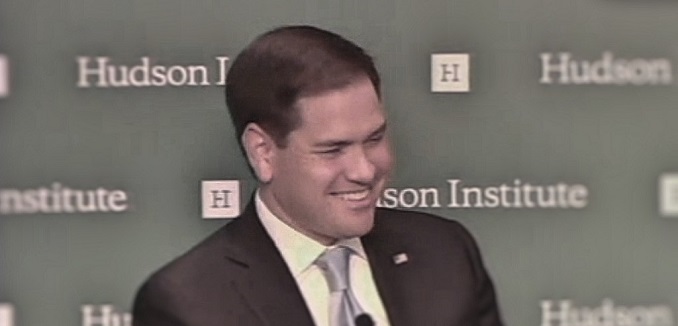Israel needs to hold on the Golan Heights “for the foreseeable future” to as a buffer against the instability in Syria, and “the wisdom of that has only increased” since Syria descended into an intractable civil war, former presidential candidate Sen. Marco Rubio (R-Fla.) said in wide-ranging talk at the Hudson Institute on Tuesday.
Rubio, who had recently returned from a trip to the Middle East, offered his views on the war against ISIS, the futures of Syria and Iraq, Iran’s regional aggression, and American global leadership. He argued that American engagement after World War II was essential in developing global peace and prosperity, especially in Asia. While economic shifts have caused some Americans to want to disengage from the world, the vacuums that ensue often end up threatening the United States.
“From the pure selfish national security interest of the United States, we want to see stability in Syria, in Iraq, because in the absence of that stability you are going to have radicalized groups who are going to be using it to stage and conduct external operations against the United States and its interests,” he explained. Rubio clarified that the “radicalized groups” include not only ISIS, but also Iran, which has seized upon American disengagement from the region as an opportunity to expand its sphere of influence and threaten American allies.
Rubio was asked during the audience Q&A about the future of the Golan. “I think that in the short term the Golan isn’t going anywhere,” Rubio replied. “It’s going to continue to be an important buffer for Israel, especially given what you now see on the ground. I think that in the longer term that’s a position that I’m also open to.” Rubio fell short of suggesting that the U.S. should demand Israeli sovereignty as an up-front condition, but pointed out that “even if Israel tomorrow decided that we don’t want the Golan anymore, who exactly would they turn it over to? Iran, since they basically control Damascus and the Syrian regime?” Israeli control of the strategic territory will therefore have to continue “for the foreseeable future” as a buffer against the increased instability in Syria, he said, as well as against Iranian proxies using Syrian areas as a launching pad for attacks, which he described as “a bigger long-term threat to Israel.” “On the issue of the Golan, there is no one to turn it over to… As part of the final matrix” of a permanent settlement, “it’s likelier than not that the Golan Heights will remain in Israeli control for a long, long time.”
The senator was also asked about the recent New York Times Magazine profile of Ben Rhodes, a former aspiring novelist who became President Barack Obama’s deputy national security adviser for strategic communications. Rubio responded that Rhodes succeeded in his messaging of the Iran deal, as the deal was eventually implemented after the Senate failed to block it. But he questioned the long-term effects of the deal, stating his concern that Iran would be immune from diplomatic pressure once it attained nuclearization. “I’m concerned about foreign policy being written as a novel, as opposed to what’s in the long-term interests of the United States,” he said. He was also critical of the agreement the White House concluded with Cuba. “If you send a speechwriter to negotiate with trained intelligence officers, you usually get a bad deal.”
Rubio also criticized the possibility that the U.S. would support a United Nations resolution spelling out terms of a peace deal between Israel and the Palestinians. “I don’t think you can impose a solution.” He expressed doubts that Israel has a true partner to negotiate with, and given the unity government between Fatah and Hamas, “it’s difficult to deal with people who have stated that their goal is your destruction.” Instead, Rubio said, the focus should be on improving conditions for the residents of Gaza and the West Bank. But the conditions for peace do no exist at a time when Palestinian children are taught “how glorious it is to kill Israelis and Jews.”
A video of the talk is embedded below.
Broadcast live streaming video on Ustream
[Photo: Hudson Institute ]




